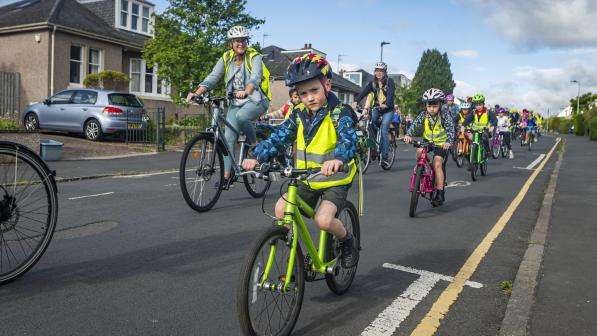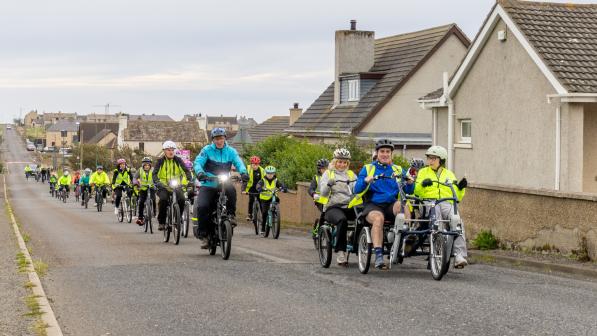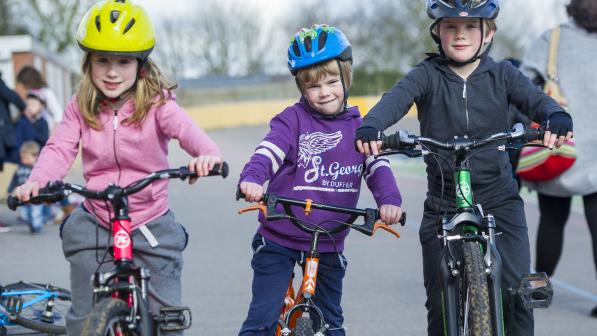How can we create a family cycling culture in the UK?

On Sunday (27 July) the 2025 edition of the Tour de France came to a conclusion on the Champs Elysee with Tadej Pogačar in the coveted yellow jersey.
Thirteen years ago, in 2012, it was the now legendary Mark Cavendish sprinting to glory in Paris with Sir Bradley Wiggins winning the yellow jersey. Inspired by British success I took my eldest child to the park that evening where they took their first unassisted bike ride. A momentous day in our house.
Learning to ride a bike is still seen by many as a rite of passage and an essential life skill which opens up the world to freedom and independence for children.
Sadly, however, while many children learn to ride and enjoy Bikeability training at primary school, very few continue to develop their skills and cycle when they progress to secondary school.
Every child should be given the opportunity to learn to ride, but this alone would not create a family cycling culture in the UK.
Cycling as a family
Even though our family had a car, we regularly transported our kids by bike – in bike seats when they were toddlers, progressing to tagalong bikes before they could ride for themselves.
Thirteen years on, my eldest is studying at university and rides a bike for regular journeys like shopping and travel to the local climbing wall. My youngest prefers riding a bike for leisure and keeping fit.
When they were younger, we sometimes went for a family bike ride and have done a few holidays by bike, including cycling the Hebridean Way in 2022, which I highly recommend.

Cycling as a family is a great way to spend time together, have fun and to secure some downtime from screens. But sadly, for many children their experience of riding a bike is limited to cycling in the local park, or when parents load up the car with bikes for a day cycling ‘somewhere nice’.
I would love to see more families enjoy riding bikes together, but I don’t think going on regular family rides necessarily equates a family cycling culture.
A family cycling culture
I think creating a family cycling culture in the UK must start at home with individual families.
A family with a cycling culture is one where family members don’t just go for leisure rides together but where it’s normal for family members to jump on a bike for local everyday journeys.
It doesn’t have to mean people are riding a bike every day, but it’s a common thing for parents, children or wider family members to think about their journey choices and, when possible, choose to ride a bike for their transport.
If you want children to cycle, I think it’s important for adults to lead by example and cycle for short everyday journeys rather than taking the car. This is not an easy step to take. Many parents are rightly concerned about how busy and unsafe the roads seem.
It’s also a significant challenge as an adult to get back on a bike or to change travel choice habits – especially breaking the habit of grabbing the car keys when going somewhere.

It would be brilliant if more people could experience the benefits of cycling to school, college, work or for regular short journeys.
For creating a family culture of cycling it would be even better if it was a normal thing for families to ride together for joint journeys rather taking the car; for example, cycling to Granny’s for Sunday dinner, to the cinema, for a local shopping trip, or to watch a son or daughter play football on a Saturday morning.
Making cycling an easier choice
To create this elusive family cycling culture, lifestyle changes by families and individuals aren’t enough. Local and national governments – and wider society – need to act to create the conditions required so that a family cycling culture can grow and thrive in the UK.
Here’s a list of things which would help make it easier for busy families.
Bikeability – I’ve already mentioned the importance of kids learning to ride but we also need more courses for adults who want to get back on a bike, and higher levels of training for children and adults who want to develop their cycling skills and confidence.
Bike buses – Local authorities and schools should support bike buses so children can enjoy riding to school together. Schools also need to do all they can to encourage and enable cycling as a normal way to get to school.

Workplaces – Businesses can help change staff culture by promoting cycling to work. Safe and secure cycle parking, showers and changing facilities, and becoming a Cycle Friendly Employer, are all things that employers can do.
Cycling infrastructure – We need more dedicated cycle lanes, routes and networks where people on bikes are separated from traffic and feel safe to ride.
Women are more likely than men to be often put off cycling by fear of busy traffic, which is why Cycling UK’s ‘My ride. Our right’ campaign is calling on government to create the cycling infrastructure we all need.
Women are also more likely to be involved in childcare and the school run, so governments must listen to women when it comes to enabling children and families to cycle.
We know many children want to cycle to school but parents need to feel confident that their children will be safe when doing so. We desperately need more Schools Streets Initiatives and safe cycle routes installed so children can cycle in safety to primary and secondary school.
Funding – Of course, money is needed to create safe space for cycling in our communities, and Cycling UK is calling for governments in the UK to raise their ambitions and commit at least 10% of their transport budget to invest in active travel projects.
Quieter streets – Not every road can accommodate a cycle lane but with actions such as speed restrictions and clever redesign, local authorities can calm traffic in neighbourhoods and make it them more conducive to cycling.

Governments must also take action to provide people with alternatives to driving and encourage people to leave the car at home. Fewer cars would reduce traffic congestion and make roads feel safer for cycling.
Attitude change and reversing motonormativity – As a society we’ve got so used to the car being the dominant form of transport that we’ve developed unconscious biases in its favour, including ignoring all the negative aspects of driving, such as congestion, pollution, physical inactivity, unsafe driving and road deaths.
This phenomenon has been dubbed ‘car blindness’ or motonormativity.
Perhaps the hardest task of all in creating a cycling culture is to change societal attitudes, but it can be done if we put the above into action and highlight the many positive benefits of cycling.
The Netherlands and Denmark didn’t always have a cycling culture – they made long-term, deliberate policy shifts after the 1970s oil crisis and urban safety concerns.
More recently, cities like Seville, Paris and Bogotá have experienced rapid cycling growth after building bold infrastructure and reshaping road priorities.

Reaping the benefits
The benefits of creating a family cycling culture would be enormous and revolutionary for the UK.
Families would save money and be able to spend quality time together, exercising, being healthy and helping to reduce their impact on the planet. Children would develop positive habits and healthy lifestyles, and gain freedom and independence.
Research by Cycling UK found that when children cycle it helps families juggle activities and time pressures, reduce stress, and allows better access to non-school activities.
Creating a family cycling culture in the UK can only start if adults lead the way and show cycling is as normal a form of transport as using a car or bus. It starts with children being encouraged to do their Bikeability training and then being taken by adults on rides so they can develop their cycling skills.
Importantly, it will need governments to invest in our neighbourhoods to create the safe cycling space and quieter streets needed for more people to ride in safety. We know this works.
Finally, it will take a shift in perception and attitude from the media, businesses, planners, politicians and individuals, away from the car and motonormativity, to make communities happier, healthier and greener for people and for families to travel safely by bike for everyday journeys.


